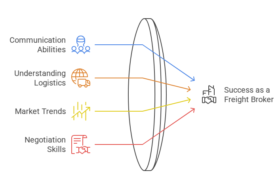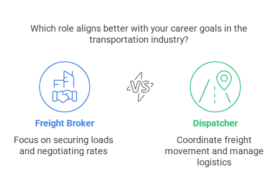Are you ready to embark on a fulfilling and promising career in the transportation industry? If so, the first step on your journey is freight agent training. Becoming a freight agent allows you to play a vital role in the logistics chain, connecting shippers and carriers to ensure goods reach their destinations efficiently. This article will guide you through the essential aspects of freight agent training and how it can lead to a successful career in freight brokerage.
The Role of a Freight Agent
Freight agents, also known as freight brokers’ agents or freight forwarders, act as intermediaries between shippers and carriers. They facilitate the transportation of goods by negotiating rates, arranging shipments, and ensuring smooth logistics operations. Freight agents work closely with both clients and carriers to deliver exceptional service and build lasting relationships within the industry.
Why Choose Freight Agent Training?
Starting your career with freight agent training offers numerous benefits that set you on the path to success:
- Comprehensive Knowledge: Training equips you with a deep understanding of the freight brokerage industry, its regulations, and best practices.
- Industry Insights: Learn from experienced professionals who share real-world insights, giving you a competitive edge.
- Business Development Skills: Master the art of sales, negotiation, and customer service to thrive as a freight agent.
- Flexibility and Independence: As a freight agent, you can work as an independent contractor, enjoying the freedom to manage your schedule and clients.
- Potential for Growth: Starting as a freight agent can lead to building your brokerage business or advancing to higher roles in the industry.
The Journey of Freight Agent Training
- Understanding the Industry
Begin your journey by familiarizing yourself with the freight brokerage industry, its terminology, and the roles of different stakeholders. - Freight Agent Regulations
Learn about the legal and regulatory aspects of freight brokerage to ensure compliance and avoid pitfalls. - Sales and Negotiation Techniques
Develop your sales and negotiation skills to effectively communicate with clients and carriers, securing profitable deals. - Building a Client Base
Understand the importance of building and maintaining strong client relationships to foster trust and loyalty. - Effective Communication
Master the art of communication to coordinate with carriers, shippers, and other industry professionals seamlessly. - Utilizing Technology
Embrace technology and utilize freight brokerage software to streamline operations and enhance efficiency. - Handling Challenges
Learn to troubleshoot and address challenges that may arise during freight transportation to ensure smooth operations.
Frequently Asked Questions
What qualifications do I need to become a freight agent?
There are no strict qualifications, but freight agent training programs equip you with the necessary skills and knowledge.
Can I work as a freight agent from home?
Absolutely! Many freight agents work remotely, leveraging technology to communicate and manage operations.
What is the earning potential of a freight agent?
Freight agent earnings can vary based on experience, client base, and the volume of transactions, but it offers significant income potential.
Do I need prior experience in the transportation industry?
No prior experience is necessary, as freight agent training provides a comprehensive foundation for your career.
Starting your journey with freight agent training is the gateway to a prosperous and rewarding career in the transportation industry. As a freight agent, you will play a crucial role in the logistics process, ensuring the efficient movement of goods and building valuable connections within the industry.So, if you’re eager to make your mark in the world of freight brokerage, take the first step and enroll in a reputable freight agent training program today!
Growth + Change = Opportunity! How are you going to capitalize on the opportunity as a freight broker, agent, dispatcher or box truck carrier?








